Happiest Minds Technologies Pvt Ltd, a next generation Digital Transformation company, adopted Mindfulness as a regular practice at workplace, starting August 29, 2016. Happiest Minds is the first Indian company and one of the very few global companies to adopt the practice of Mindfulness for all its employees. This new shift aims at helping and training employees grow calm, relaxed, balanced, observant, attentive and aware. Mindfulness is the practice of focusing one’s attention on the moment and, without judgment, observing all aspects of the world around them as well as their thoughts, feelings and reactions.
Here SkillOutlook talks to team of Happiest Minds Technologies Pvt Ltd on various aspects of practices of mindfulness, its impact on the company and its latest trend. Sharon S. Andrew, PhD, Happiness Evangelist at Happiest Minds Technologies Pvt. Ltd. and Sunil Shirguppi, SVP of Big Data and Analytics at Happiest Minds Technologies have participated in the email-based Interview.
(1) What is mindfulness and its practices?
Mindful is rich in meaning – a truly considerate and attentive person, always mindful of the needs of others (Merriam-Webster Dictionary) – and is associated with a huge mindfulness movement.
Mindfulness is the practice of focusing one’s attention on the moment and, without judgment, observing all aspects of the world around them as well as their thoughts, feelings and reactions. It is moment-by-moment awareness of our thoughts, feelings, bodily sensations, and surrounding environment and acceptance without judging or believing that there’s a ‘right’ or ‘wrong’ way to think or feel in a given moment.
Some of the mindfulness practices include Breath Watch (quietens an agitated mind by focusing on one’s breath), Mindful Listening (practices to increase non-judgmental listening), Third Mind Technique (builds empathy), Sense Walk (increases awareness of one’s surroundings) and Body Scan (paying attention to various parts of one’s body helps in sensing tension and enables one to feel relaxed and refreshed).
(2) How mindfulness practices foster innovation in employee engagement and workplace culture?
An increase in mindful behaviour brings with it a variety of physical, psychological and social benefits. It improves creativity, innovative thinking and a sharp assessment of the current reality. Mindfulness in leaders can create workplace cultures that enable creativity and performance, resets the way we look at issues at hand and modifies the approach to innovate.
There are three main parts to our brain – the neocortex where creative thinking happens, the limbic system which processes our emotions, motivations and memories and the reptilian brain that is concerned with our survival and flight or fight responses.
Mindfulness meditation has been shown to reduce the reactivity of the reptilian brain and stimulate the neocortex, thereby enhancing our creative function.
A regular meditation practice will actually the mind to foster innovation in employee engagement and culture.
(3) Why Happiest Minds Technologists have adopted for Mindfulness?
Happiest Minds was launched in 2011 with the mission of “Happiest People. Happiest Customers.” Our Core Values Sharing, Mindful, Integrity, Learning, Excellence and Social Responsibility lend themselves to an acronym SMILES which are the beacon for us.
Continuing our journey in the exploration of happiness and how it can be enhanced in an organization we have adopted the concept of mindfulness. As a commitment to our goal to be mindful in our approach to clients and team-members, we adopted “The Mindful IT Company’” as our tagline on the 5th anniversary of our launch.
Mindfulness is a worldwide movement and we are proud to be the first Indian IT company to consciously embrace this philosophy. A mindful company that offers individuals an environment to live in the moment and perform with purpose; its customers, a trustworthy partnership by living our core values; and the community,contributions as an empathetic corporate citizen.
The focus is on Being Mindful (Living In the Moment) and Doing Mindful which involves: Perceiving Immersively, Processing Non-judgmentally & Performing Empathetically.
(4) Can you brief about employee strength and workplace culture at Happiest Minds Technologies?
Happiest Minds has a little over 2000 people. Headquartered in Bangalore, we have operations in the US, UK, The Netherlands, Australia, Middle East and Turkey.
Our philosophy is simple – happy people make happy customers. Our mission is a constant reminder of the fact that we are in the business of making our customers happy through happy people. People are an integral part of our business and their happiness is of utmost importance. Our systems, policies and practices are crafted to foster an open culture, enabling our people discover their potential and participate in shaping their own work life experience. This is how we make a difference.
At Happiest Minds, we have identified a few predictive factors that enable happiness. Some of them are organizational factors such as fairness, transparency and joy in the workplace. The others are individual oriented, such as wellness, enriched personal life and giving back to the society.
In a nutshell this is what is our culture – Culture of Gratitude, Philosophy of Happiness, Culture of Happiness Evangelism, Focus on Wellness and Culture of Listening.
(5) What differences are seen by adopting such a practice within the organization (Happiest Minds Technologies)?
We have distilled the principles of mindfulness for Happiest Minds and identified tools and techniques that can be practiced on a daily basis. We encourage our people to set aside 60 minutes a week to explore, understand and imbibe the philosophy of mindfulness.
Training programs for Breath Watch (quietens an agitated mind by focusing on one’s breath), Mindful Listening (practices to increase non-judgmental listening), Third Mind Technique (builds empathy), Sense Walk (increases awareness of one’s surroundings) and Body Scan (paying attention to various parts of one’s body helps in sensing tension and enables one to feel relaxed and refreshed) help us realize the full potential of being mindful.
Adoption of the Mindfulness theme has benefited Happiest Minds in two ways – Internal: People productivity & better operational efficiencies, and External: Benefits to brand & increased revenue
At the organisational level, it has helped build teamwork, trust and acceptance of different points of view; it has increased our awareness of the impact of our actions on others and makes one responsive, rather than reactive.
At the individual level, our people have reported health benefits like lower blood pressure, enhanced concentration and elevated levels of empathy for others.
(6) What is future of employee well-being industry/practices, especially in India?
When people are happy at work, they are healthier and happier in life. Pressures at the workplace and stress combined with outstanding performance expectations have necessitated re-definition of wellness in companies.
The future of organizational practices lies in wellness. Therefore, companies would be wise to weave wellness into their business strategy for Organisational effectiveness.
(7) How tech companies can enhance the well-being, productivity and performance of their employees?
People in pursuit of their careers should also actively pursue holistic wellness. Not just physical wellness; spiritual and emotional wellness is paramount. At Happiest Minds, wellness is seen through the lens of happiness and we believe that both are co-related. Mindfulness opens up possibilities for not just the organization but the individual and is part of our continuing efforts towards our mission of “Happiest People . and Happiest Customers.
Companies are called more now than before, to concentrate on the well-being of its people. Their aim should be to build harmonious and productive environments by facilitating a healthier work life balance towards a personally enriched life. Research[1] shows that people in organisations with focus on well-being had a lower intent to leave, greater pride in the company and a willingness to recommend it to others.
An organization that supports wellness with clearly defined wellness initiatives and programs is the one that has efficient, productive and performance oriented people.
(8) Skills are transforming? Do you perceive any threat to tech professionals with rapidly growing footprint of Artificial Intelligence and Automation?
There is definitely a threat to tech professionals from Automation and advancements in AI. But that doesn’t mean all tech jobs will vanish because of AI. In fact we at Happiest Minds believe AI and Automation will make tech professionals more productive by eliminating some repetitive and mundane tasks. Current tech jobs that involve managing information (like project managers) can partly be done by AI based applications in a much more efficient manner. Some companies have also started investing into RPA (Robotic Process Automation) that can potentially do some of the work done by system administrators and dev Ops functions.
(9) What are your suggestions for tech professionals how they can re-skill themselves to face the impact of Artificial Intelligence and Automation?
Our suggestion for tech professionals is to closely looks at their respective areas and see how they can acquire new skills that will make them stand apart. There is enough study material available online to acquire new skills and also to look at specific areas to see kinds of investments companies are making when it comes to AI and Automation. Another area to keep an eye on is the startup ecosystem that focuses on AI and Automation.
[1]Workplace Stress: Impact & Outcome – An India Study 2016, Chestnut Global Partners.






